Have you ever thought about some surefire ways to use ChatGPT for SEO as a beginner or professional website content creator?
Well, if you’ve not, it’s time to cut down costs and give your productivity an incredible boost by writing SEO content with ChatGPT. Do not worry, we will show you how to get it done with ease and change your AI content writing game for good!
Gone are the days you have to spend hours or days writing content for your blog. With our well-written and easy-to-follow ChatGPT SEO guide, you can write SEO-friendly articles in ChatGPT for your blog and achieve your desired ranking goals.
Quality content creation remains one of the biggest challenges of most content creators especially in a highly competitive business domain like blogging. Both newbies and professionals are in the race to rank number #1 on search engine result pages (SERP). However, search engine optimized content creation which usually takes hours and even up to days to write for your website, can now be done in a few minutes with the help of artificial intelligence. While you can now churn out multiple blog posts using AI tools like ChatGPT, it’s pertinent to consider your ChatGPT SEO prompts by going out of the box, from what you already know to something extraordinary.
Every website owner understands the need for SEO in their business growth, whether you’re a website owner or working for an agency, you can impress your boss by taking the SEO game of the company to the next level, leveraging the power of ChatGPT. So, if you want to generate SEO content with ChatGPT, this guide is specially baked for you. We will not only teach you how to create search-engine-optimized content with ChatGPT but we will also share important SEO plugins for ChatGPT, SEO browser extensions for ChatGPT, and additional SEO tools that will help you achieve optimum results.
SEO ordinarily involves a lot of work such as keyword research, competitor analysis, content creation, link building, and many more tedious and time-consuming tasks that make many website owners give up on their projects when they’re not getting the desired search engine traffic required to propel their businesses to the next level. Learning ways you can use ChatGPT for content creation and SEO tasks, will not only save you time but will incredibly give your productivity a boost.
Before we continue on how to use ChatGPT for SEO content creation, and website optimization, to drive massive organic traffic to your website, let’s take a look at what ChatGPT is, and then what SEO is all about before we can dive deeper into the topic of discussion.
What is ChatGPT?
ChatGPT is a conversational artificial intelligence platform built by OpenAI, it is a large language model trained on a humongous data set to generate human-like responses in a conversational setting. ChatGPT can understand and respond to a wide range of topics and is designed to engage in natural and coherent conversations with users. To learn more about ChatGPT and how to create a ChatGPT account, we’ve published an easy-to-follow guide on what is ChatGPT and ChatGPT signup guide.
What is SEO?
Search engine optimization (SEO) is the process of optimizing a website to improve its ranking on search engines like Google, Yahoo, and Bing. The importance of SEO cannot be overstated, as it plays a critical role in driving traffic to a website. There is no doubt that most people use search engines to find information, products, and services, having a website that is optimized for search engines is essential for any business or organization that wants to succeed online.
SEO is important because it helps businesses and organizations to reach their target audience. By optimizing their website for search engines, businesses can increase their visibility online, making it easier for potential customers to find them. This is particularly important for small businesses and startups that are trying to establish themselves in a highly competitive market. Without SEO, these businesses may struggle to attract traffic to their website, which could impede their growth and limit their reach.
But wait, how can we explain SEO to a 7-year-old? Here’s it…
Alright, imagine you have a favorite book, and you want to tell your friends about it. You might use certain words to describe the book, like “exciting adventure,” “funny characters,” or “amazing pictures.” Now, think of the internet as a huge library with lots of books (websites).
Search Engine Optimization, or SEO for short, is like using the best words to describe your favorite book so that when someone else is looking for a book about exciting adventures, funny characters, or amazing pictures, they can easily find your book in the library.
When people use a search engine like Google, they type in words or phrases they’re interested in, just like you might ask a librarian for a book about dinosaurs or princesses. SEO helps websites use the right words and organize their information so that search engines can understand and recommend them to people looking for specific things.
So, in simple terms, SEO is like making sure your favorite book is easy to find in the big library of the internet by using the right words and organizing things well.
SEO, or Search Engine Optimization, is a set of practices and strategies aimed at improving a website’s visibility on search engines like Google. The goal of SEO is to increase the quantity and quality of organic (non-paid) traffic to a website. Search engines use complex algorithms to determine the relevance and authority of web pages, and SEO seeks to optimize a website’s content, structure, and other elements to align with these algorithms.
The key aspect of SEO includes:
- Keyword research: The use of SEO tools to analyze search volume, user intent, and competition for specific keyword(s)
- One-page SEO: To optimize individual pages on your website for targeted keywords, include keywords in strategic places such as titles, headings, meta descriptions, and throughout the content. Proper HTML markup and a clear site structure for search engine crawlers.
- Content quality: The creation and maintenance of high-quality, relevant, and valuable content that meets the needs of your audience.
- Technical SEO: To focus on the technical aspects of your website such as loading speed, mobile friendliness, crawlability, and general site structure.
- Off-page SEO: This involves the creation of a strong backlink profile from reputable websites.
- User experience: Improved font size and style to aid readability, and build easy navigation on your website.
- Local SEO: Website optimization for local searches, best for local businesses.
- Analytics and monitoring: Website submission to search engines, general website analytics, and keyword improvement.
Incredible ways to use ChatGPT for SEO
How do I generate SEO content with ChatGPT? There’s no doubt that ChatGPT is a highly powerful chatbot platform that can be used for various purposes, including search engine optimization (SEO). AI content generation tools are becoming increasingly popular in recent times as apparatus to write content fast to improve user engagement and overall website experience.
One way ChatGPT can be used for SEO is by providing users with relevant and valuable content. By using natural language processing (NLP) and machine learning algorithms, ChatGPT can understand the user’s intent from the title it’s writing about and provide them with the information they need. This can help improve the user experience and increase the time spent on your website, which can ultimately lead to higher search engine rankings.
Below are common ways through which you can use ChatGPT to write an SEO-friendly article today. We didn’t just list what you can use ChatGPT for in search engine optimization, we also included examples of smart SEO prompts for ChatGPT to help make blog content creation easier for you. There’s also a list of other important SEO tools you can blend with ChatGPT for incredible content and website optimizations.
1. Keyword research and optimization
One of the most significant applications of ChatGPT in SEO is keyword research and optimization. ChatGPT can help in identifying relevant keywords for a particular website by analyzing the content of the website. It can point out the most commonly used words and phrases and suggest relevant keywords that can help improve the website’s ranking on search engines.
ChatGPT can also help in identifying long-tail keywords that can be used to target a specific audience. By using long-tail keywords, a website can attract more targeted traffic, which can lead to higher conversion rates. Take a look at the example ChatGPT prompt for the long tail keyword we used and the responses from ChatGPT.
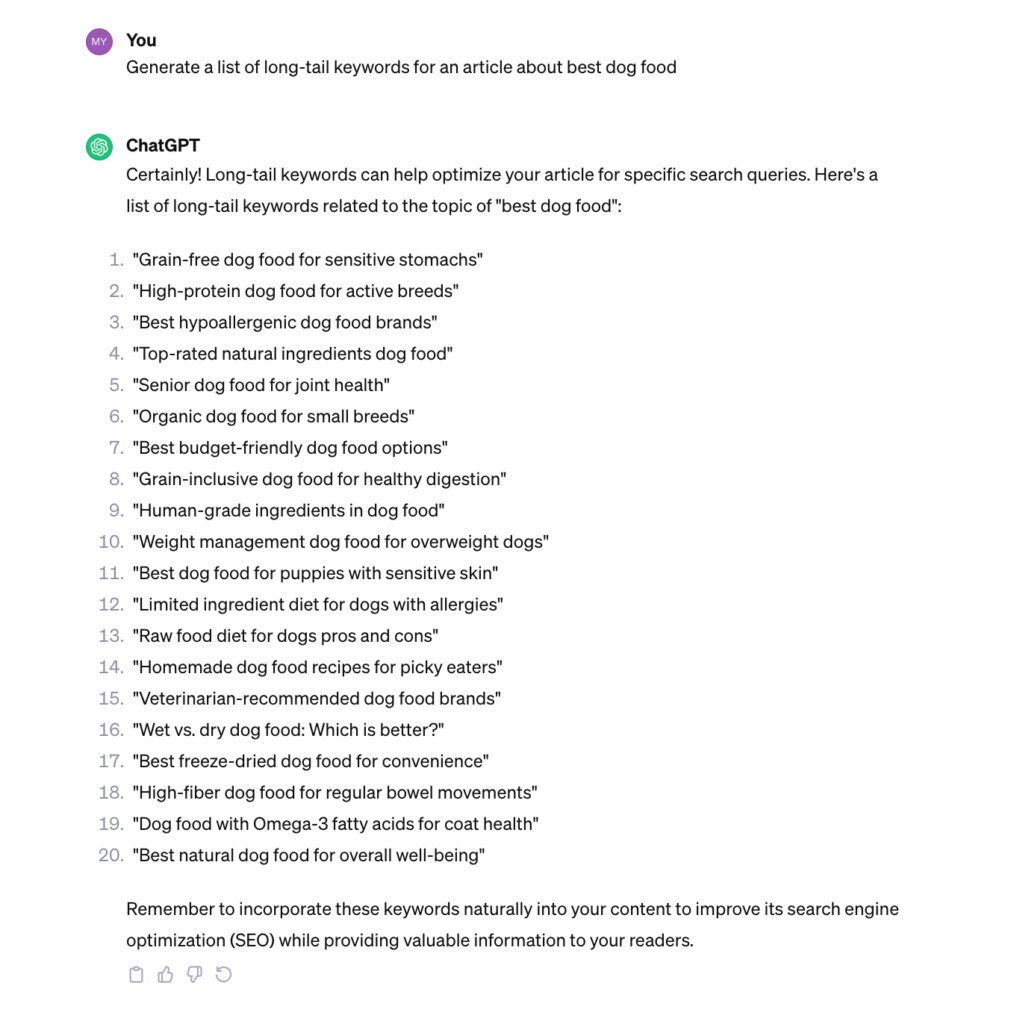
From the above ChatGPT SEO prompt for long-tail keywords, you can see that we’ve got up to 20 different long-tail keywords for your query, you can also ask ChatGPT to write more and the list will continue in a new chat. To avoid keyword cloaking, you’re also advised by ChatGPT at the end of the response to integrate any of these long-tail keywords into your content naturally. That’s simply a piece of powerful SEO advice from AI AI-powered chatbot.
2. Niche-specific content ideas
Despite choosing a niche or mapping out a sub-niche for your blogging business, there are times you would feel there’s nothing to write about again and that you’re already running out of content. When using ChatGPT for SEO, you can generate niche-specific content ideas by inputting relevant keywords and prompts related to your industry or target audience. For example, if you’re in the fitness industry, you can ask ChatGPT to generate content ideas for “effective home workouts” or “nutritious meal plans for weight loss.” Alternatively, you can tell ChatGPT your niche and ask that it generates SEO friendly content ideas for your newly created blog or already existing blog that you want to revamp.
If you’re looking for unique blog content ideas for beginners or even if you’re a pro blogger who wants to implement automation into your blog topic ideas generation to quickly craft unique blog ideas that people would like to read, you can get started with just a line of prompts.
Take a look at the following response as we simply narrated what our niche is all about and got SEO blog content ideas from ChatGPT.
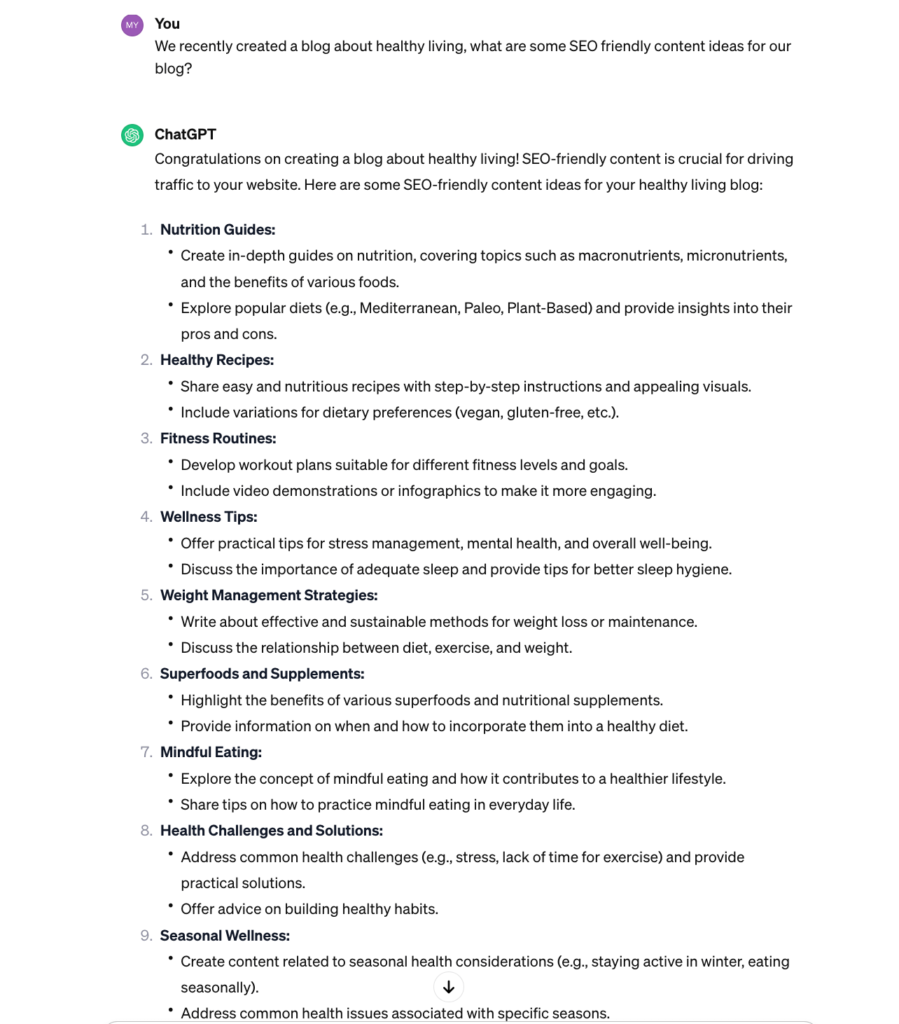
From the response following our prompt on blog post content ideas using ChatGPT for a newly created blog, we didn’t just get the possible categories we can use for our new blog, we also got a lot of suggestions for what we can discuss under such categories. The screenshot above shows that there are still more content ideas in the area we cropped out. However, you can copy and paste our ChatGPT prompt examples into the ChatGPT chat box to see it in action, you can also modify the prompt for your specific niche.
3. Eye-catching title generation
If you craft a catchy blog post title, you’ve done a greater percentage of the work required in crafting SEO content that gets to the first page of Google and other popular search engines. Great content without a catchy title will most likely not get clicks. While both blog content and title matter, it’s pertinent to make sure that your content reflects your title to avoid misleading people with clickbait titles.
We will show you how you can use ChatGPT as your blog post title generator to craft titles that get clicks using our formula or title templates. For example, you can ask ChatGPT to suggest compelling titles for your next blog post on Mastering Home Workouts or Guide to Healthy Eating on a Budget.
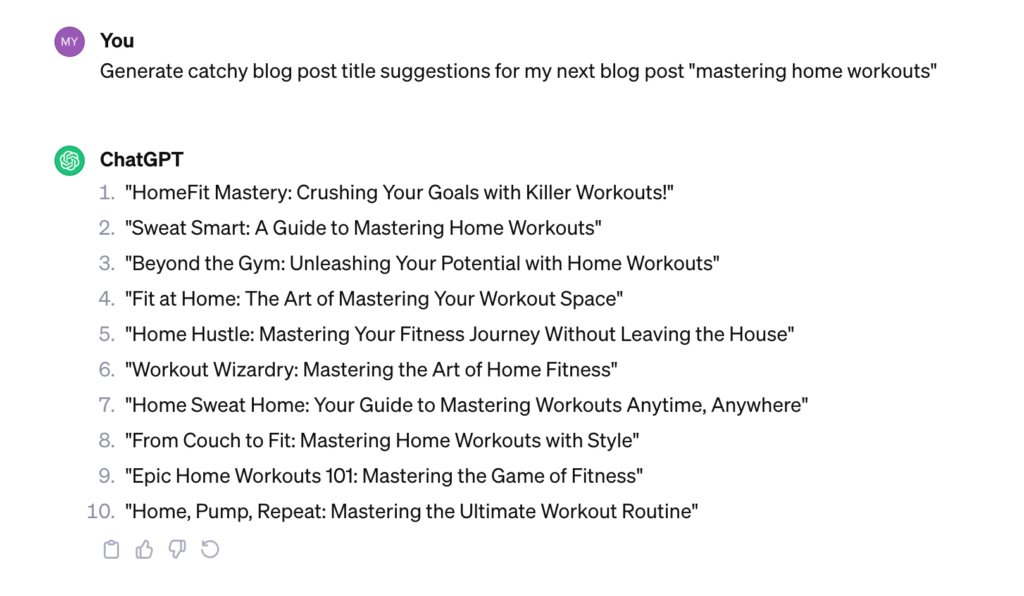
From your ChatGPT SEO title prompt, you can determine how many titles you want ChatGPT to generate for you. Alternatively, you can make use of the regenerate response button below the response generated to get a new title suggestion.
4. Content outline
A blog post outline can help you determine your blog post direction/angle of view and structure in general so you can discuss it in sections. Writing a blog post outline for SEO can be done using ChatGPT in simple steps. A common blog post content outline template comprises the; blog post introduction, main body, and conclusion. Having a clear blog post or article structure will improve readability and boost your ranking as crawlers can easily index your content knowing what every section of your blog post talks about.
Crafting a perfect blog post outline can be achieved simply by providing the main topic or keywords, and ChatGPT can help outline the subtopics, main points, and supporting details to include in your content.
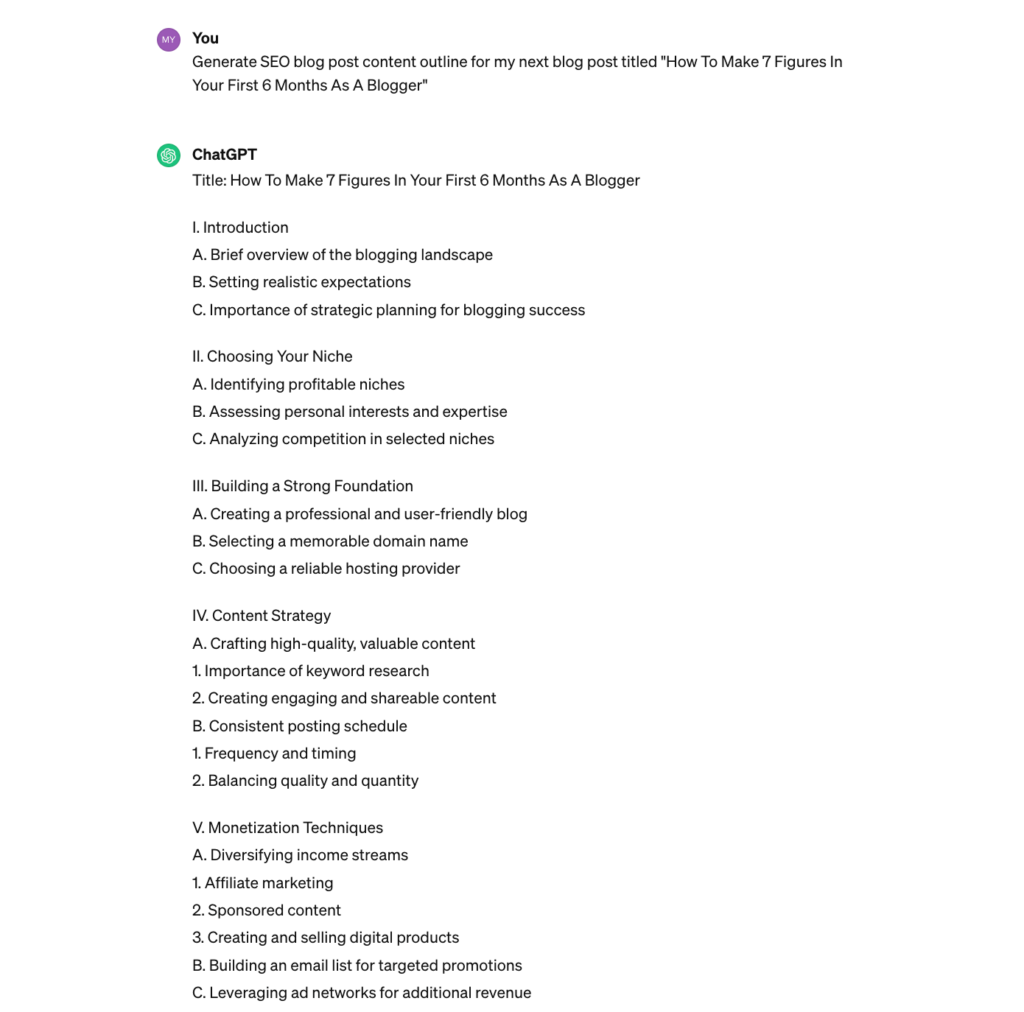
You can simply copy our prompt example and paste it on ChatGPT to see it in action. Always feel free to tweak the prompts to fit into what you want to achieve in your blog post as the outline.
5. Content Creation
How do I create content for my blog? This is the common question most newbie bloggers ask, but AI content writing apps are revolutionizing the way content creation is made. With highly advanced AI writing tools like ChatGPT, someone with little or no background knowledge of writing content for a blog can actually churn out hundreds of articles using AI but the question is, are those content well optimized for search? A well-written blog post content can entertain, and inspire your readers, and help them solve real-life problems. Helpful content is a big deal in SERP rankings and quality blog post content creation cuts across research, planning, writing, and publishing written text as blog posts or articles, product reviews, and many more. Images and visuals can be incorporated into a blog post to beautify and add more meaning to the written material.
We will try one of our ChatGPT prompts for writing blog posts to see what response we will get from ChatGPT. The response will be attached below, you can also copy out the prompt, edit it, and send it to ChatGPT for the kind of content you want to write with the AI chatbot from OpenAI.
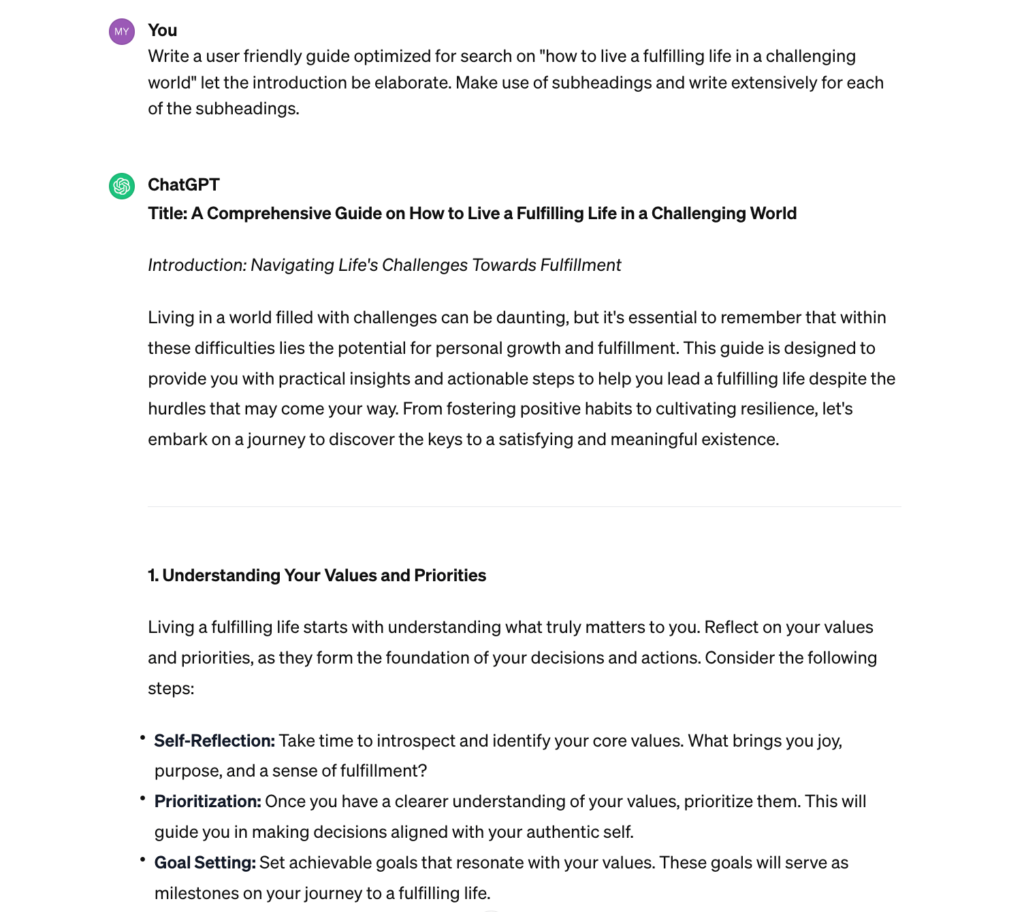
Important notice: We discovered that using ChatGPT for SEO yields better results in writing content when you pick your blog post outline and enter each of them as a question. We’ve already shown above, how to come up with a perfect blog outline to get the best content from ChatGPT.
The quality of content you will get depends heavily on the AI blog writing prompts you have. ChatGPT blog post prompt that’s well strategized can easily create high-quality content for a website. It can generate unique and engaging content that is relevant to the website’s niche. This can help in attracting more visitors to the website and improving its ranking on search engines.
6. Meta Descriptions
How do you write a meta description for a blog? Well, you do not need to be a pro before you can craft a good meta description for SEO on your website or web articles. There are key things to note while writing meta descriptions for SEO using ChatGPT, be concise, and ensure that the main keyword in the content you want to summarize is well placed in the description of your blog post or article.
Meta descriptions are short descriptions that appear below the website’s title on search engine results pages. They provide a brief summary of the website’s content and can help in attracting more visitors to the website. ChatGPT can generate meta descriptions that are relevant to the website’s content and optimized for search engines. This can help in improving the website’s ranking on search engines and attracting more visitors to the website.
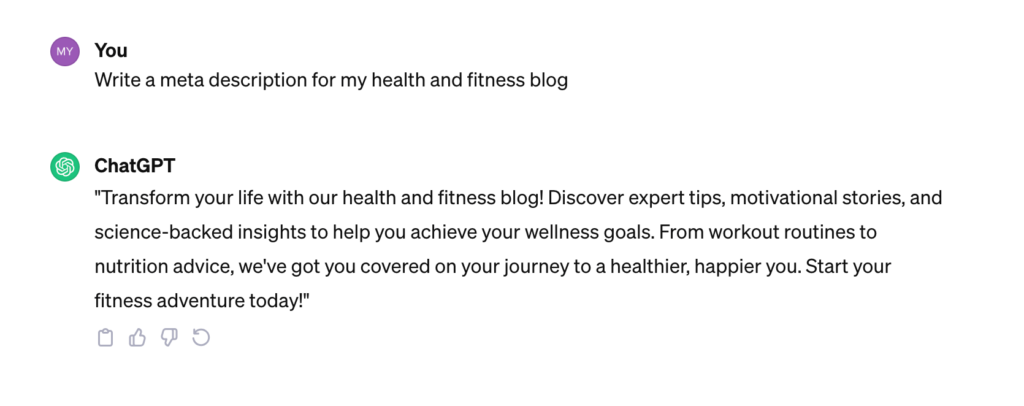
It’s important to note that when using ChatGPT for meta description, your main keyword(s) should be in the description, and pay attention to how long your meta description for a blog is. Keep it not more than 170 characters in length and filter out irrelevant parts of the response from ChatGPT.
7. Write FAQs and answers
FAQs bring question and answer into your website content by allowing you to ask questions just as your visitors would do or to compile a list of questions many people have asked about your products and services and provide answers/solutions to them. You can use ChatGPT to achieve this purpose simply by letting it know what the topic or content is all about and it will generate the most likely relevant questions people are asking with the appropriate answers for you. This is best for people who include frequently asked questions about their products and services on their website.
ChatGPT can be used to generate FAQs and their corresponding answers based on your niche. Input common questions related to your industry or products, and ChatGPT can help generate informative and relevant answers to address those queries, which can be beneficial for SEO purposes.
Honestly, the above steps are incredible ways to use AI to improve SEO and write SEO content with ChatGGPT. The Chat GPT impact on SEO will be a positive one only if you know how to use SEO prompts, are keen to modify the content generated, and make sure that you’ve done appropriate fact-checking before publishing the content on your website. How to use AI to improve SEO?
Benefits of using ChatGPT for SEO
Creating content with ChatGPT has a lot of SEO benefits if done the right way, and here are some of the few benefits of using ChatGPT for SEO.
Efficiency and accuracy
ChatGPT can be used for SEO by providing quick and accurate answers to common search queries. With its advanced natural language processing capabilities, ChatGPT can understand the intent behind a user’s query and provide relevant and accurate answers. This can save time and effort for SEO professionals who would otherwise have to manually research and analyze search data. ChatGPT can help identify and prioritize keywords and phrases for SEO campaigns. By analyzing search data and user behavior, ChatGPT can provide insights into the most relevant and valuable keywords for a particular website or industry. This can help SEO professionals optimize their content and improve their search rankings.
Cost-effectiveness
Using ChatGPT for SEO can be a cost-effective solution for businesses of all sizes. Unlike traditional SEO tools and services, ChatGPT does not require a large investment or ongoing subscription fees. Instead, businesses can use ChatGPT for free and upgrade to the paid version only if they want to install plugins and have access to advanced data sets, and fast responses in addition to prioritized support. The ChatGPT subscription is affordable when compared to other content creation tools powered by AI.
ChatGPT can help businesses save money on PPC advertising by providing insights into the most effective keywords and phrases for organic search. By optimizing their content for these keywords, businesses can improve their organic search rankings and reduce their reliance on paid advertising.
User engagement
Writing well-optimized content for search with ChatGPT can generally improve user engagement and satisfaction on a website. By providing quick and accurate answers to common questions, ChatGPT can help users find the information they need without having to navigate through multiple pages or search results. This can improve the overall user experience and encourage users to spend more time on a website.
How does ChatGPT for SEO works?
Search Engine Optimization (SEO) is the process of optimizing a website or web page to rank higher in search engine results pages (SERPs) for specific keywords and phrases. It involves various techniques such as on-page optimization, off-page optimization, and technical optimization to improve the visibility and ranking of a website. ChatGPT is an AI-powered chatbot that can help businesses improve their SEO efforts. The chatbot utilizes natural language processing (NLP) technology to understand user queries and provide relevant responses.
Here’s how it works…
ChatGPT uses NLP algorithms to understand user queries. When a user types in a query, the chatbot analyzes the text and identifies the keywords and phrases that are relevant to the query. This helps the chatbot provide accurate and relevant responses to the user, it also can leverage the data available to plugins to provide well-optimized content that will drive search traffic to your website.
Once ChatGPT understands the user’s query, it uses its vast knowledge base to provide relevant responses. The chatbot can provide information on a wide range of topics, including SEO best practices, keyword research, content optimization, and more.
What is the importance of SEO?
Honestly, the importance of SEO cannot be overstated, as it is essential for any business or organization that wants to succeed online.
Organic traffic
SEO is crucial for driving organic traffic to a website. When a website is optimized for search engines, it becomes more visible to potential customers who are actively searching for products or services related to the business. By appearing higher on SERPs, a website is more likely to attract clicks and visits from interested users. This can lead to increased brand awareness, higher conversion rates, and ultimately, more revenue for the business.
Trust and credibility
A website that ranks high on SERPs is perceived as more trustworthy and credible by users. By implementing SEO best practices, such as optimizing content for keywords and improving site speed and user experience, a business can establish itself as an authority in its industry. This can lead to increased customer loyalty, positive reviews, and word-of-mouth referrals.
Improved user experience
SEO is not just about optimizing for search engines, but also about improving the user experience on a website. By making a website more user-friendly and easy to navigate, businesses can reduce bounce rates and increase the time users spend on their site. This can lead to higher engagement, more conversions, and ultimately, more revenue.
SEO challenges and solutions
Search engine optimization has a lot of benefits and it’s not entirely free from challenges. The following challenges of SEO are common;
Algorithm updates
One of the biggest challenges of SEO is keeping up with the ever-changing search engine algorithms. Search engines like Google are constantly updating their algorithms to provide the most relevant and useful search results to their users. These updates can have a significant impact on a website’s rankings, and if a website is not optimized according to the latest guidelines, it can suffer a significant drop in traffic and rankings.
To overcome this challenge, SEO professionals need to stay up-to-date with the latest algorithm updates and adjust their strategies accordingly. They need to constantly monitor their website’s performance and make necessary changes to ensure that it remains compliant with the latest guidelines.
White Hat vs Black Hat SEO
Another challenge of SEO is the ongoing battle between white-hat and black-hat SEO techniques. White hat SEO techniques are ethical and follow the guidelines set by search engines, while black hat SEO techniques are unethical and attempt to manipulate search engine rankings.
While black hat SEO techniques may yield quick results, they can also result in severe penalties from search engines, including being blacklisted from search results altogether. On the other hand, white hat SEO techniques may take longer to yield results, but they are more sustainable and can help a website build a strong online presence over time.
To overcome this challenge, SEO professionals need to focus on using white hat SEO techniques that are compliant with search engine guidelines. They need to avoid using black hat techniques that can result in penalties and focus on building a strong online presence through ethical and sustainable SEO practices.
What is the future of SEO after ChatGPT
The impact of ChatGPT on SEO has made many people ask if ChatGPT will replace SEO jobs, the truth is that ChatGPT can help SEO writers improve their skills and speed up their delivery rate but will not be the end of SEO. We also strongly argue that ChatGPT is not the best tool for SEO.
Generally, artificial intelligence (AI) is changing the way search engines work. With AI, search engines are becoming smarter and more intuitive, and can deliver more accurate and relevant results. This means that businesses need to focus on creating high-quality, relevant content that is optimized for search engines.
AI is also being used to personalize search results based on a user’s search history and preferences. This means that businesses need to focus on creating a personalized experience for their users and providing content that is relevant to their interests and needs.
The future of SEO is focused on creating high-quality, relevant content that is optimized for users rather than crawlers, content can also be optimized for voice search. By doing so, businesses can ensure that their content is easily discoverable and relevant to their target audience.
ChatGPT SEO supporting tools
There are numerous ChatGPT-powered tools strategically built with highly advanced SEO techniques which you can blend into your SEO content writing skill using ChatGPT. We will look into the effective use of such awesome AI tools for SEO and how they can help you drive massive organic traffic to your website.
ChatGPT SEO plugins
There are ChatGPT plugins for SEO that can help with SEO activities such as keyword research, backlink data, and complex SEO metrics. However, we can split the plugins into two categories; ChatGPT plugins available to the WordPress content management system and ChatGPT SEO plugins accessible only through the ChatGPT Plus account.
ChatGPT SEO plugins for WordPress
Aside from the traditional SEO plugins for WordPress such as Yoast SEO, and Rank Math, the following are examples of ChatGPT WordPress plugins for can help you to up your SEO-optimized content game.
- AI Engine: With over 40,000 WordPress installations, AI Engine prides itself as the best AI content generator for WordPress that leverages the power of GPT-4 Turbo, GPT-4.0, GPT-3.5 Turbo, and the GPT-3.0 models from OpenAI to allow users create fresh and engaging content for their blogs.
- AI Power: This is an open-source AI solution for WordPress that uses AI models from OpenAI such as the GPT-3.5, GPT-4, and Davinci to generate unique content, images (DALL-E and Stable Diffusion), and forms, it allows customizations through its advanced tools and can be trained with your own data, it can also serve as your website chat widget, it’s WooCommerce compatible.
- DiagnoSEO: From XML sitemap generation to focus keyword placement, internal link suggestion, to custom rel canonical URL and meta robots control. The DiagnoSEO plugin for WordPress helps users create content that ranks better in search engines.
ChatGPT Plus SEO plugins
We will reveal the list of best Chat GPT plugins for SEO in this section.
If you’re new to chatGPT Plus, follow this guide on how to get ChatGPT plugins. Most ChatGPT plugins are free but you will have to subscribe to ChatGPT premium membership of $20 per month to access the plugins library in your ChatGPT 4. The following plugins can help you do ChatGPT SEO optimization without leaving the chatbot interface.
- Speedy SEO Marketing Chat GPT plugin: This is one of the best Chat GPT SEO plugins on the plugins store for generative AI SEO-friendly content and conducts market analysis to help users gain deep market insights for growth.
- SEO Assistant: The SEO Assistant ChatGPT plugin utilizes an advanced machine learning algorithm to generate a list of target keywords that can take your website to the front pages of search engines.
- SEO Core AI: Apart from developing a personalized keyword strategy for your blog against your competitors, SEO Core AI formerly known as SEO GPT is utilized by SEO experts to improve the general qualities of a website because it can easily give SEO advice which if implemented will yield incredible results.
- Bramework Plugin: This powerful AI SEO tool utilizes an artificial intelligence content generation mechanism to help website owners craft quality content for their websites/blogs. It’s easy to install in ChatGPT Plus, this innovative plugin is also available as an AI SEO plugin for WordPress, which makes it easier for WordPress users to harness.
ChatGPT SEO Extension
Without leaving your current tab, there are a good number of SEO extensions for ChatGPT that you can easily download and install on your Chrome browser, firefox, or Microsoft Edge to have a seamless SEO content creation experience, without going from one tab to the other.
If you’re looking for a GPT extension for SEO, this part of our guide has a special interest in revealing to you, the best SEO extension for ChatGPT. Whether you’re looking for a keyword research plugin for ChatGPT, meta description extension, or article SEO optimization ChatGPT, you will definitely find our list of ChatGPT Chrome extensions helpful.
- ChatGPT for Chrome & YouTube: This AI-powered browser extension utilizes OpenAI GPT models such as GPT-3.5 and GPT-4.0 to optimize articles and generate summaries from YouTube videos.
- AIPRM for ChatGPT: AIPRM is an innovative browser extension that utilizes the power of artificial intelligence to give recommendations for generating SEO-optimized content with AI. From AI-powered keyword suggestions to real-time content analysis and even more, the AIPRM Chrome extension has proven to be a reliable AI SEO extension for search-engine-optimized content creation using artificial intelligence.
The most popular SEO tools you can use with ChatGPT
Honestly, search engine optimization and driving traffic to your website organically goes beyond writing about what’s in your head. It takes a lot of work around keyword research, well-written content, website speed, and easy to navigate website structure, and many more factors. That’s why there’s a need to integrate other important SEO tools in your use of ChatGPT for SEO content writing. Important Free SEO tools every content creator should use alongside ChatGPT include the following:
Ahrefs
Ahrefs is a well-known SEO toolset that provides valuable insights and data for optimizing websites and improving their search engine rankings. It offers features such as keyword research, backlink analysis, competitor analysis, content exploration, and rank tracking. Ahrefs is widely used by digital marketers, SEO professionals, and website owners to enhance their online presence and visibility.
Semrush
Semrush is a popular tool used for keyword research, competitive analysis, and website optimization. It provides valuable insights into search engine optimization (SEO), pay-per-click (PPC) advertising, content marketing, and social media management. Many businesses and digital marketers use Semrush to improve their online visibility and drive more traffic to their websites.
Google Trends
Google Trends is a useful tool that provides insights into the popularity of specific search terms over time. It allows users to analyze and compare the relative search volume of different queries, providing valuable data for content creators, marketers, and researchers. This information can be used to identify trending topics, understand regional interests, and make informed decisions about content and advertising strategies.
Grammarly
Grammarly is a popular writing assistant tool that helps users improve their grammar, punctuation, and style. It provides suggestions for correcting errors and enhancing the clarity and effectiveness of written communication. Grammarly can be used as a browser extension, a desktop app, or a mobile keyboard, and it is widely utilized by students, professionals, and individuals who want to enhance the quality of their writing.
FAQs
Is SEO still worth it?
Yes, SEO remains one of the best ways of boosting your online visibility and attracting new customers. Two out of every three would most likely search for what they want online, before making a purchase. SEO teaches you how to create quality and evergreen content that will keep bringing traffic to your website organically over time. This will interestingly, reduce the amount of money you spend on advertisements to reach more prospects and to retarget your audience.
Is there any AI tool for SEO?
Yes, SEO can be done with AI. ChatGPT is currently one of the most powerful AI tools revolutionizing SEO content creation using artificial intelligence. While it has its limitations, it contributes to a great extent, making content creation easier by cutting down the time spent in writing content and the costs of hiring SEO writers, however, it still needs human touches to yield the required results.
Can I get AdSense approval with ChatGPT content?
While Google is not against content generated by ChatGPT or any other AI tools, we can clearly admit that ChatGPT and any other AI tool might lack accuracy and will not satisfy the Google E-E-A-T if there are no human touches to the content generated with such tools. However, Google Adsense pays attention to quality content, whether or not it’s written by AI or humans, if they’re of low quality, it will be difficult to get AdSense approval.
Is AI content bad for SEO?
The Answer is Yes/No. If you churn out content with AI without fact-checking, you could end up generating false content as some AI writers lack the ability to fetch real-time information. This can significantly affect your website’s ranking negatively. On the other hand, AI in content creation if well utilized, can bring out the best content that will make it to the top of search.
How do I use ChatGPT for backlinks?
You can use ChatGPT for link building by writing quality content that will attract backlinks from high DA websites, or by quickly crafting well-optimized guest post articles and discovering relevant websites where to publish them.
Does Google detect ChatGPT content?
While Google has the technologies to figure out content written with ChactGPT, Google is not against the use of ChatGPT and has started in its webmaster blog that it’s not focusing on how content is generated but the quality of the content. Google focuses on quality, it doesn’t matter whether it was written by AI or humans.
Will ChatGPT replace SEO?
The primary purpose of ChatGPT is not to replace SEO writers, however, writers who are not SEO experts can use ChatGPT to improve their skills and get more done in less time. This alone, is capable of revolutionizing the SEO content writers sphere.
Is ChatGPT 4 good for SEO?
Yes, ChatGPT 4 is good for SEO because it allows you access to the plugins library where you can install ChatGPT SEO plugins that will help you generate search-engine-optimized content for your website.
Can you use ChatGPT for SEO keywords?
ChatGPT can be used for SEO keyword generation ideas to automatically get relevant keyword suggestions around a given topic or niche.
Can I use ChatGPT content on my website?
It is more of a personal preferences to use or not use ChatGPT content on your website. There are no standard rules that say you should never upload content from ChatGPT on your website.
Can ChatGPT content rank on Google?
Yes, ChatGPT content can rank on Google if it satisfies some or all the ranking factors for a specific search engine.
Conclusion
ChatGPT as an innovative AI chatbot, understands SEO key terms such as; such as long tail keyword, anchor text, meta description, duplicate content, and internal link, and can carry out SEO tasks effortlessly, such as keyword research, content creation, competitor analysis, link building, and even more. However, to effectively use ChatGPT for SEO, one must understand what it takes to build high-quality content that search engines will fall in love with, so as to utilize this amazing chatbot to create content that shows E-E-A-T (Experience, Expertise, Authority, and Trust).
If you join top brands who are using ChatGPT the right way for content optimizations, you will discover that ChatGPT does not only have the ability to create content for your blog or website but can also help you generate lines of code that can help improve user experiences on your website, it can help you write codes for contact form, email subscriber form, live chat so you can offer live support powered by AI to your website visitors and even more. The simple truth is that you can utilize ChatGPT for a variety of SEO activities that will begin to flood your website with organic traffic. As you create your SEO-optimized content for search, ensure you have Google webmaster set up and submit your website to Google search console, and also other popular search engines such as Bing, Yandex, and Biaudu. Your website submission to search engines should also be done alongside your website XML sitemap which you can generate with plugins such as All in One SEO (AIOSE), Yoast SEO, and Rank Math or ask ChatGPT to generate a sitemap for your website, using the plugin we mentioned earlier in this guide.






